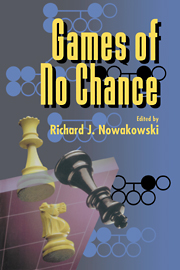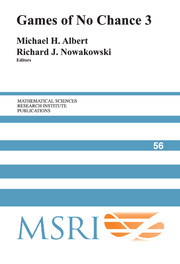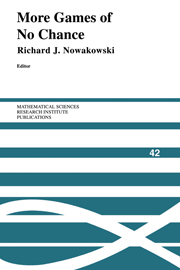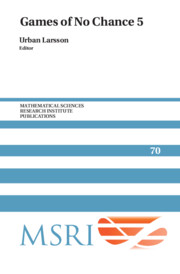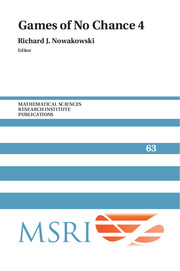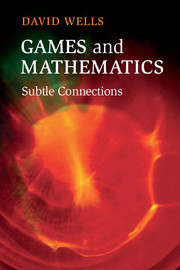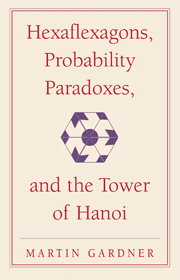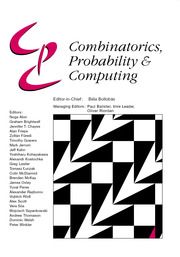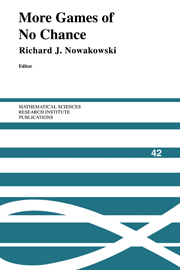Games of No Chance
£50.99
Part of Mathematical Sciences Research Institute Publications
- Editor: Richard J. Nowakowski, Dalhousie University, Nova Scotia
- Date Published: February 1999
- availability: Available
- format: Paperback
- isbn: 9780521646529
£
50.99
Paperback
Other available formats:
Hardback
Looking for an inspection copy?
This title is not currently available on inspection
-
Is Nine-Men Morris, in the hands of perfect players, a win for white or for black - or a draw? Can king, rook, and knight always defeat king and two knights in chess? What can Go players learn from economists? What are nimbers, tinies, switches and minies? This book deals with combinatorial games, that is, games not involving chance or hidden information. Their study is at once old and young: though some games, such as chess, have been analyzed for centuries, the first full analysis of a nontrivial combinatorial game (Nim) only appeared in 1902. The first part of this book will be accessible to anyone, regardless of background: it contains introductory expositions, reports of unusual tournaments, and a fascinating article by John H. Conway on the possibly everlasting contest between an angel and a devil. For those who want to delve more deeply, the book also contains combinatorial studies of chess and Go; reports on computer advances such as the solution of Nine-Men Morris and Pentominoes; and theoretical approaches to such problems as games with many players. If you have read and enjoyed Martin Gardner, or if you like to learn and analyze new games, this book is for you.
Read more- Presents the mathematics behind popular games such as checkers, chess, and Go in articles by top names in the field
- First two parts are written for a general audience, later chapters present research findings
- Contains an annotated list of unsolved problems and a comprehensive bibliography
Reviews & endorsements
'No one interested in two-person combinatorial games should hesitate before acquiring this splendid book. Leading experts report on the latest research involving such classic board games as checkers, chess, and go. Other familiar games are analyzed in depth, and many exciting new games are introduced. Did you know that go moku, nine-men morris, and Sol Golomb's pentomino game are now solved? Did you know that computers are getting close to solving checkers? Fifty-two tantalizing unsolved problems are posed by Richard Guy, and Aviezri Fraenkel's bibliography lists 666 references! Games of No Chance is a great collection of elegant, entertaining papers - a book to put on the shelf alongside the classic two-volume Winning Ways by Elwyn Berlekamp, John Conway, and Richard Guy.' Martin Gardner
See more reviews'A thoroughly edited volume, Combinatorial Game Theory at its best.' European Mathematical Society
Customer reviews
Not yet reviewed
Be the first to review
Review was not posted due to profanity
×Product details
- Date Published: February 1999
- format: Paperback
- isbn: 9780521646529
- length: 552 pages
- dimensions: 234 x 156 x 28 mm
- weight: 0.78kg
- contains: 199 b/w illus. 49 tables
- availability: Available
Table of Contents
Part I. All Games Bright and Beautiful:
1. The angel problem John H. Conway
2. Scenic trails ascending from sea-level Nim to Alpine chess Aviezri Fraenkel
3. What is a game? Richard K. Guy
4. Impartial games Richard K. Guy
5. Championship-level play of dots-and-boxes Julian West
6. Championship-level play of domineering Julian West
7. The gamesman's toolkit David Wolfe
Part II. Strides on Classical Ground:
8. Solving Nine Men's Morris Ralph Gasser
9. Marion Tinsley: human perfection at checkers? Jonathan Schaeffer
10. Solving the game of checkers Jonathan Schaeffer and Robert Lake
11. On numbers and endgames: combinatorial game theory in chess endgames Noam D. Elkies
12. Multilinear algebra and chess endgames Lewis Stiller
13. Using similar positions to search game trees Yasuhito Kawano
14. Where is the 'Thousand-Dollar Ko'? Elwyn Berlekamp and Yonghoan Kim
15. Eyespace values in Go Howard A. Landman
16. Loopy games and Go David Moews
17. Experiments in computer Go endgames Martin Müller and Ralph Gasser
Part III. Taming the Menagerie:
18. Sowing games Jeff Erickson
19. New toads and frogs results Jeff Erickson
20. X-dom: a graphical, x-based front-end for domineering Dan Garcia
21. Infinitesimals and coin-sliding David Moews
22. Geography played on products of directed cycles Richard J. Nowakowski and David G. Poole
23. Pentominoes: a first player win Hilarie K. Orman
24. New values for top entails Julian West
25. Take-away games Michael Zieve
Part IV. New Theoretical Vistas:
26. The economist's view of combinatorial games Elwyn Berlekamp
27. Games with infinitely many moves and slightly imperfect information (extended abstract) David Blackwell
28. The reduced canonical form of a game Dan Calistrate
29. Error-correcting codes derived from combinatorial games Aviezri Fraenkel
30. Tutoring strategies in game-tree search (extended abstract) Hiroyuki Iida, Yoshiyuki Kotani and Jos W. H. M. Uiterwijk
31. About David Richman James G. Propp
32. Richman games Andrew J. Lazarus, Daniel E. Loeb, James G. Propp and Daniel Ullman
33. Stable winning coalitions Daniel E. Loeb
Part V. Coda:
34. Unsolved problems in combinatorial games Richard K. Guy
35. Combinatorial games: selected bibliography with a succinct gourmet introduction Aviezri Fraenkel.
Sorry, this resource is locked
Please register or sign in to request access. If you are having problems accessing these resources please email [email protected]
Register Sign in» Proceed
You are now leaving the Cambridge University Press website. Your eBook purchase and download will be completed by our partner www.ebooks.com. Please see the permission section of the www.ebooks.com catalogue page for details of the print & copy limits on our eBooks.
Continue ×Are you sure you want to delete your account?
This cannot be undone.
Thank you for your feedback which will help us improve our service.
If you requested a response, we will make sure to get back to you shortly.
×
